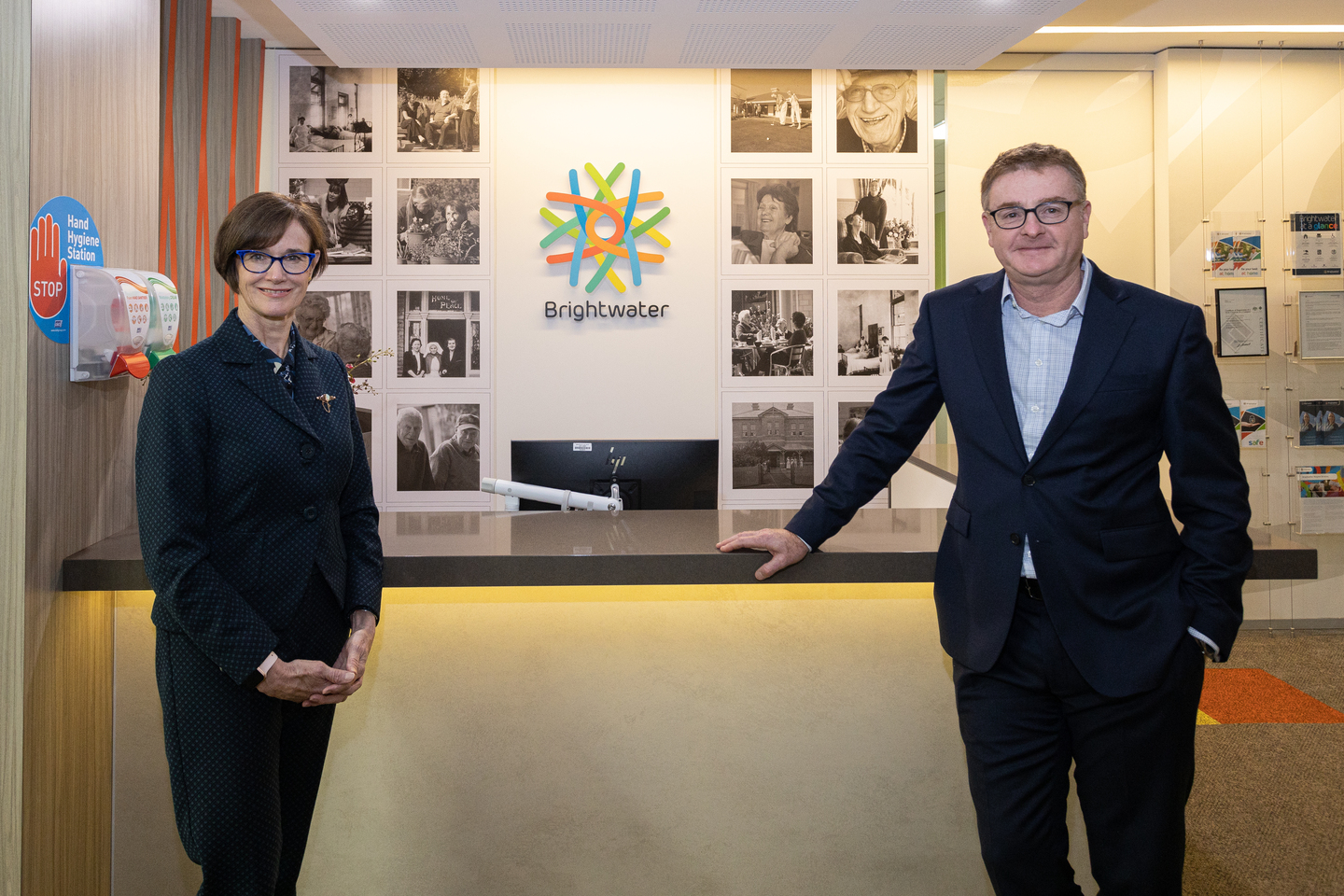Few businesses in Western Australia have felt the impact of the COVID-19 pandemic in the way that Brightwater Care Group has, with aged care being challenged like almost no other sector while other income streams for the organisation have been severely curtailed.


Few businesses in Western Australia have felt the impact of the COVID-19 pandemic in the way that Brightwater Care Group has, with the aged care sector facing unprecedented challenges in recent months.
Yet it would be hard to read that in Brightwater chief executive Jennifer Lawrence’s demeanour as she discusses her role through this crisis with Business News for a Success and Leadership SNAPSHOT video.
With fear and anxiety felt much more keenly in aged care than the broader community, Ms Lawrence said she believed that staying calm was key as she sought to reassure staff and customers that Brightwater was managing the situation appropriately.
“The impact on aged care has been monumental,” Ms Lawrence said.
“Really clear and consistent communications has been so important,” she added.
“Being calm and consistent has also been important.
“If I am calm, even if I might not be underneath it all, our managers are calm and our staff are calm.”
Perhaps some of that calm may be attributed to her scientific background as well as her deep knowledge of her organisation’s capabilities and that of the broader sector.
Prior to becoming an administrator and manager, the 17-year Brightwater veteran had been in research and diagnostics focused on haematology.
Until being elevated to chief executive four years ago, she had been a long-term general manager at Brightwater, with risk as one of her key responsibilities.
Nevertheless, staying calm at the helm was testing, especially with well-documented shortages of protective equipment, the vulnerability of the elderly to the virus and core sources of funding drying up due to economic hibernation.
Brightwater is not just the eighth biggest aged care provider by bed numbers; its diversity as a facilities management services provider outside the sector in fields such as catering and linen puts it just outside WA's top 50 employers, with more than 2,000 staff.
It sits firmly in the top 10 not-for-profit organisations in the state, according to the Business News BNiQ database.
The collapse of tourism and hospitality, notably hotels that used Brightwater’s linen service, has hit the group hard, but in a very different way from its core aged care business.
“Shutting the hotel sector in March has meant we have lost 60 per cent of our custom, so that has been quite difficult to negotiate,” Ms Lawrence said.
“We had to work quickly to reduce our cost base and, of course, (the federal government’s rescue package) JobKeeper helps with that as well.”
Allied health services Brightwater offers in areas such as rehabilitation have also been restricted, but it is clearly in aged care where the business faces its biggest risks.
In Britain, which has the highest death toll in Europe, aged care facilities have been decimated.
Even in Australia which has been relatively unscathed in terms of mortality, aged care facilities in eastern states have proved vulnerable, second only to cruise ships in terms of a source of infection.
Ms Lawrence said acting early was critical in managing this crisis.
“Back in March, when we saw this coming, we went in early and we went in hard and put in restrictions that were above what the Commonwealth eventually recommended, so we were ahead of the Commonwealth,” she said.
“The nature of the care that (our staff) provide to our clients means they can’t put the same social distancing steps in place to reduce the risk, so very early we had to decide what we could do to reduce the risk to our clients.
“The only big lever we had was to reduce the throughput of people on our sites, so that meant putting some restrictions on our sites in terms of families, contractors and volunteers and making sure only essential workers were able to visit our sites.
“That was really hard. It was hard on families, hard on staff and hard on clients.”
Ms Lawrence said WA's success in limiting the extent of the pandemic was significant.
“We have been able to relax some of those restrictions,” she said.
Ms Lawrence said the situation had highlighted the role technology plays in allowing Brightwater to offer an alternative to visitations.
“One of the things we had to work on was digital capabilities to connect our clients to their families, so we were able to roll out iPads and Skype to our sites," she said.
She said Brightwater had also digitised other initiatives such as offering allied health consultations online and making a music program virtual.
“I am hoping we are going to learn a lot from this pandemic and I think in terms of digital capability we have moved ahead in leaps and bounds because of this crisis and hope we don’t step back to what it was before,” Ms Lawrence said.
Like other leaders that Business News has spoken to in other sectors, Ms Lawrence said there were positives to come from the crisis; notably, better communication and collaboration within and outside the organisation.
“I think there is a real opportunity for us to continue working differently, and the things we have learned as an organisation around the frequency and clarity of communication, I believe, has brought the organisation together.
“We are also working with other providers and with government much more so than we have in the past, by necessity, and I would like to see that continue.
“Rather than all of us doing our own thing we can actually deal with challenges together and I think that is very positive.”
Similarly, she credits the role of peak bodies with educating and supporting operators in her sector, especially those without Brightwater’s resources.
More immediately, Brightwater’s pandemic response had included temporarily shelving plans for redeveloping corporate office and building another residential aged care site.
“I think there’s a real danger or threat we won’t kick off those projects early enough and therefore we might run behind and we are already talking now about reigniting our strategy and pushing ahead with those projects,” Ms Lawrence said.
Another outcome of the crisis may be a sharpening of the response of the sector and government to issues arising from the ongoing Royal Commission into Aged Care Quality and Safety.
The public’s faith in aged care broadly has taken a battering from revelations in the Royal Commission focused on neglect and funding.
While WA’s aged care sector has thus far avoided virus outbreaks, it does seem likely that the industry’s vulnerability will come into consideration.
“The Royal Commission is asking for submissions from providers around COVID-19,” Ms Lawrence said.
“I think that might bring out some of the issues we have in our industry in terms of connection with the acute sector, in terms of funding and probably not necessarily funding but the business model around aged care and whether that model, which has been around for generations, is still the right model for now.
“I suspect there will be some significant recommendations.”
In the interim, the sector still has to navigate its way through the other side of the pandemic, with the threat of a second wave as current restrictions are lifted during our winter season.
Ms Lawrence said there were less people asking to come into residential aged care and some services remained postponed.
She believes it will be an 18-month journey before anything approaching normality is resumed, with the aged care sector remaining especially vigilant as borders are reopened.
The lessons from the terrible death toll in some aged care homes in the UK, Europe and the US have not been lost on the Brightwater leader.
“We are watching and learning from that,” Ms Lawrence said.
“In Australia we are fortunate, we read the scenario really well, we were ahead.
“If we get an outbreak, all our planning needs to hit the ground and I am hoping that what we have done is enough.”













